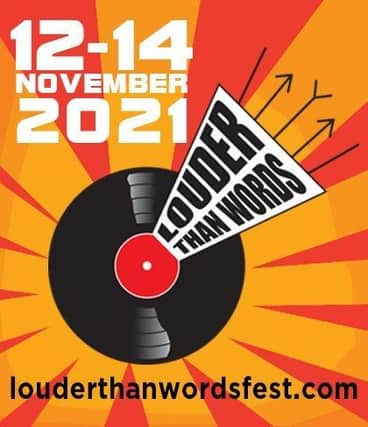Review: Louder Than Words festival, Innside, Manchester


With 30 or so discussions and panels spread over three days in its new venue Innside hotel, close to such well-known Manchester venues as Home, Ritz and Gorilla, the event, co-founded by former teacher Jill Adam and musician, journalist and broadcaster John Robb, is an impressive forum for debate as well as being a source of entertaining anecdotes. Guest speakers this year included Chris Jagger, John Illsley of Dire Straits, photographer Kevin Cummins and David Hepworth, founder of such magazines as Smash Hits, Q and The Word.
My visit on Saturday began with Australian author Lesley Chow in conversation via internet link with Zoe Howe about her book You’re History: The 12 Strangest Women in Music. Rather than the standard roll call of “weird women in music” such as Diamanda Galas, Laurie Anderson and Siouxsie Sioux, Chow explained her interest lay in music “that sits in plain sight in the mainstream” that has an “elusive quality” whose strangeness “only creeps up on you gradually”.
Advertisement
Hide AdAdvertisement
Hide AdShe cited the examples of Taylor Swift, Chaka Khan and Janet Jackson, explaining: “What for me makes a strange artist is not so much attitude or lyrics, it’s the sound they make that haunts you. I find Janet Jackson incredibly strange because of the way her music hinges the nerves.”
Where historically many music critics have favoured musicians who are “more writerly”, Chow argued funk performers such as Prince and Chaka Khan have tended to be overlooked. “The challenge for writers is to convey the dynamic of that sound,” she said. In breaking down lyrics to syllables and nuances, her mission is to “locate the joy of the song”. In the case of Earth Wind & Fire’s Boogie Wonderland and September, she suggested, that lies within oohs and aahs.
Similarly with Rihanna’s chart-topper Umbrella, it’s in the repeated “ella” and her seemingly nonchalant tone. “Critics have been put off by the lack of effort or technical skill in her voice,” she said. “She has this Teflon voice that cuts through emotion in a way I find appealing – it reminds me of the voice of Isabelle Huppert in films.”
Howe also led a fascinating conversation with Tom Clayton, whose book When Quiet Was The New Loud: Celebrating the acoustic airwaves 1998-2003, attempts to give the likes of Travis, Coldplay and David Gray belated critical due. Once dismissed by Creation Records boss Alan McGee as “bedwetter’s music”, their music has proved enduring, he argued. “They’re now part of the national songbook, radio staples that are still being belted out by buskers.”
Advertisement
Hide AdAdvertisement
Hide AdRather than being a time when music “sat on the boring stool for a while” after the hedonistic days of Britpop, Clayton also suggested there was more to the “subdued wistfulness and quiet panic” than was perhaps appreciated at the time.
The success of Travis, Coldplay, Gray and Dido was tied in with the CD format, he said, which was then all the rage. Their very ubiquity, however, “led to a lot of those records being dismissed”. Yet he feels now: “Once we have a bit of distance from those albums, we are able to appreciate their finer qualities more than we did at the time. It’s nice to appreciate the effort, song structures and lyricality.”
Others he cited as worthy of reappraisal include Kings of Convenience, Turin Brakes, Stephen Fretwell and Kathryn Williams, suggesting the influence of the ‘Quiet is the New Loud’ movement could be heard today in the music of Billie Eilish and Jane Weaver.
The big draw of the day proved to be Echo and the Bunnyman guitarist Will Sergeant, whose conversation with John Robb was full of insights into his childhood, growing up in Melling “where the countryside ended and Liverpool began”.
Advertisement
Hide AdAdvertisement
Hide AdSergeant suggested his memoir Bunnyman actually “left a lot of the freakishness out” about his upbringing, even so it’s rich in observations on his 70s childhood. Unlike punk rockers, he freely admitted to liking progressive rock from the period. “We all had Tales From Topographic Oceans, that was the underground scene going on,” he said.
There were tales of buying his first Telecaster guitar from a catalogue and of witnessing Status Quo supporting Slade. “The violence wasn’t suppressed,” he suggested. “It was mental down the front. Dave Hill was spitting cider at the crowd from a demijohn.”
Eric’s became the heart of the Liverpool music scene in the late 70s, where Sergeant and later Bunnymen Ian McCulloch and Les Pattinson went to watch bands and where they encountered characters such as Julian Cope, Jayne Casey, Pete Burns and Holly Johnson. Sergeant recalled that he had never heard McCulloch sing until they played their first gig, but: “By then we were a gang and we were the best in the world.”
The idea to use a drum machine came from Brian Eno, he said. “It only had two settings: Rock 1 and Rock 2. It was very thin and nasty but it worked.”
Advertisement
Hide AdAdvertisement
Hide AdSergeant also had fond memories of the Bunnymen’s manager Bill Drummond, later of The KLF. He was, he said, “great at organising” and “an adventurer”, full of enterprising ideas. “He tried to buy a nuclear submarine off the Ukrainians when The KLF were going,” he recalled. “He wanted to take it down the Thames and park it outside the House of Commons.”
Here’s to many more entertaining memories like this next year, when Louder Than Words celebrates its tenth anniversary.
Comment Guidelines
National World encourages reader discussion on our stories. User feedback, insights and back-and-forth exchanges add a rich layer of context to reporting. Please review our Community Guidelines before commenting.